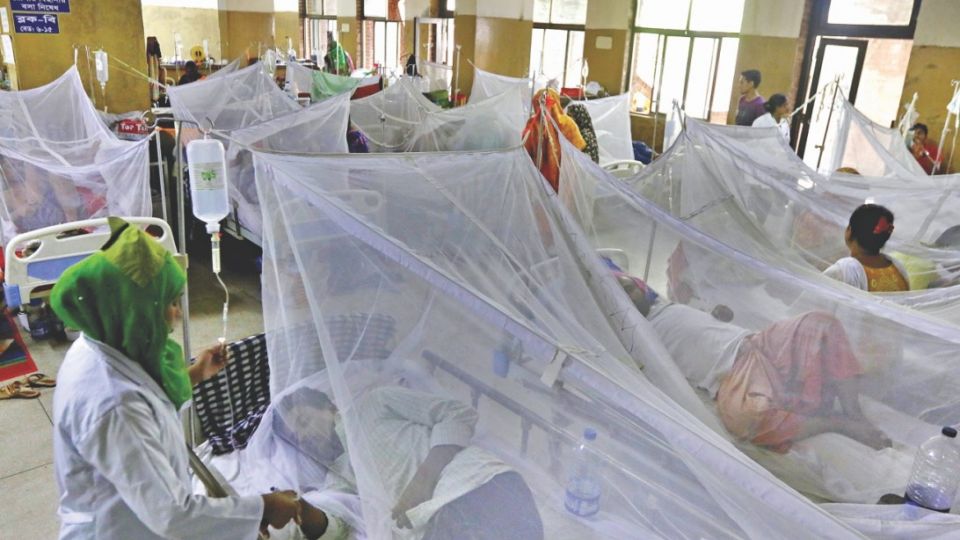July 24, 2019
Record 473 people hospitalised in a day; demand for blood spikes.
Infected with dengue haemorrhagic fever, Abdur Razzak was admitted to Dhaka Medical College Hospital on Saturday.
As his platelet count was significantly low, doctors recommended an immediate platelet transfusion, and he was given the blood cells accordingly.
But the 25-year-old service holder’s condition did not improve.
About a day and a half after the transfusion, Razzak started to bleed from his nose and mouth. Doctors then told his father Mohammad Solaiman, 60, to manage more blood donors right away.
Worried, Solaiman looked everywhere for the donors to save his only son. He finally got the blood at the DMCH blood bank yesterday morning.
“My son is about to receive the blood. His condition seems to be critical,” Solaiman told The Daily Star last night.
Contacted, an official of the blood bank said Solaiman was lucky that his son’s blood group is A positive, which is a common one. “Finding blood of the negative groups is a real challenge,” he said.
Dengue, a mosquito-borne viral disease, has taken an alarming turn this year.
Data from the Directorate General of Health (DGHS) show that 7,766 people had been infected with dengue until yesterday.
Hospital officials, however, said the number could be higher as many dengue cases go unreported.
In 24 hours since 8:00am on Monday, 473 new dengue cases were reported at hospitals, which is the highest for a single day, the DGHS data show.
Doctors said the common symptoms of dengue include fever, vomiting and abdominal pain. In many cases, the number of platelets, which help the body form clots to stop bleeding, come down significantly for which patients need platelet transfusion.
A normal platelet count ranges from 150,000 to 450,000 platelets per microlitre of blood, they said.
Meanwhile, different blood donors’ organisations said the demand for blood and platelets had increased in recent days due to dengue.
“We have been experiencing a rise in demand [of blood] since June,” said Sheikh Mohammad Faisal, coordinator of a blood donation programme of Quantum Foundation.
Earlier, they would deliver platelets to 20 to 25 people a day, but the number has now increased to 80 to 85, he said.
To get one bag of platelets, a person needs to bring four donors and spend Tk 3,200. It takes six to eight hours to prepare the platelets, Faisal said, adding that the voluntary blood donors’ organisation could also provide platelets without donors.
Nawfal Imtiaz, joint secretary of Shandhani’s Dhaka Medical College unit, said they were turning down at least 10 to 15 attendants of dengue patients every day due to a higher demand for blood compared to supply.
He urged people to donate blood on a regular basis, saying that managing blood of the negative groups was a tough challenge.
Liakot Hossain, assistant registrar of DMCH medicine unit-6, said there are three types of dengue and the patients with haemorrhagic fever needed blood the most.
HM Nazmul Ahsan, associate professor at the Shaheed Suhrawardy Medical College Hospital, said fluid management was extremely important for such patients due to a plasma leakage.
He said if any dengue patient bled, the individual should be given fresh blood, not just platelets, as blood has many necessary components.
COUNTRYWIDE DRIVE
Meanwhile, the government will start a weeklong countrywide mosquito killing and cleanliness programme on July 25.
The decision was taken at a meeting chaired by the Local Government Division Minister Md Tazul Islam on July 13.
A 22-member national committee, headed by Tazul, was formed to implement the decision and make the programme effective, said Mahbub Hossain, additional secretary (urban development wing) of the LGD.
All the local government organisations will observe the week and will work to build awareness among the people about Aedes mosquito, he said.
They will also encourage people to destroy all mosquito breeding grounds at their homes, Mahbub added.


